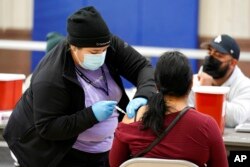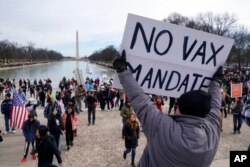When Will
Information technology'south a question many have been request for most two years: when will the coronavirus pandemic end?
"Epidemiologically speaking, we don't know. Perhaps in some other month or two — if at that place's no other variants of concern that pop up, at least here in United states," says J. Alexander Navarro, banana director of the Center for the History of Medicine at the University of Michigan.
"Socially, I think we're kind of already at the bespeak where the pandemic has ended. Many states are removing the vestiges of their mask mandates. Nosotros see people essentially moving on with their lives."
Equally of February 16, 2022, about 78 million people in the United States have contracted COVID-nineteen and 923,067 of them have died. Seventy-six per centum of the U.Southward. population has received at least ane dose of the COVID-nineteen vaccine, according to the Centers for Illness Control and Prevention (CDC).
Sara Sawyer, a professor of molecular, cellular and developmental biology at the University of Colorado Bedrock, agrees the end might finally exist in sight, in function cheers to Omicron, a COVID-19 variant that emerged in November 2021.
"It is essentially vaccinating many people who were resistant to getting vaccinated because a lot of those people got infected in this wave," Sawyer says. "So, that's just going to make it really difficult for viruses to spread through in these giant waves like Omicron anymore considering we have so many people with resistance that they've acquired through previous infection or a vaccine."
Experts predict that more than 70% of people in the United States are now either vaccinated or have recovered from a coronavirus infection, Sawyer says. She adds that an extra bonus for those who get an bodily infection is that they develop much more sophisticated systems of immunity confronting that virus.
A pandemic is generally considered "over" when a virus becomes endemic.
"When viruses become predictable — in their patterns, in their seasonality and in the number of people that they might infect and the number of deaths that they might cause — we say that a virus has become endemic," Sawyer says. "That means it has settled down into a long-term beingness with the homo population."
And while COVID-xix might never completely go abroad, future variants are not expected to be as severe as past ones.
"If yous were infected with i variant, and I was infected with another variant, and I ended upwardly in the emergency room the next day, and you lot had but a tickle in your pharynx and went to your son'southward baseball, in the grocery store and to a altogether political party, whose variant is going to spread better?" Sawyer says. "Your variant is going to spread better. We know from the history of viral development, viruses are snaking their way toward being less deadly and more transmissible. … Viruses become more than transmissible when they don't make people every bit sick."
Simply the danger of calling the pandemic over before it's really over remains.
"I call up, socially, about people are leaning toward this pandemic beingness over when, epidemiologically, it'due south not," Navarro says. "There is essentially no going dorsum. And the fear that I have today is that if we have another variant of business that pops upwards, I don't know if we're going to get people to go back to masking, if we're going to be able to implement any sort of structured closure orders if we need to."
During the 1918 flu pandemic, which killed upwards to 50 million people worldwide, Americans got tired of beingness constrained and prematurely gave up on flu prevention measures. Two more waves of the flu pandemic hit the United States, resulting in more deaths.
While some parallels can exist drawn between COVID-19 and the 1918 flu pandemic, looking to the past isn't always a proficient barometer for when this pandemic might end because of the avant-garde knowledge and technology that exists today.
"We know exactly what we're supposed to do, and this is an advantage that people of the past did not necessarily accept," says Nükhet Varlik, associate professor of history at Rutgers University-Newark. "We have the vaccines. We have the public health regulations in place. We accept the medical expertise, so we actually know what to do. Then we're really at an unprecedented reward when we compare ourselves to past societies. We tin actually do the right things. Whether nosotros do the right things, that's another question."
Varlik says request when the pandemic might end is misleading, fueling simulated hopes rather than focusing on trying to control and mitigate the pandemic.
"Information technology will go owned, simply that doesn't hateful that it cannot get pandemic again. So, it's kind of like a dance … it can be pandemic or epidemic or endemic, and information technology can change over time," Varlik says. "I am pretty confident that COVID will continue to be epidemic in one part of the world for the foreseeable time to come … and, of course, with travel and other means, it can spill over to other places, to other countries. Until it'due south eliminated in the unabridged earth, there is actually no manner of feeling safe from this disease."
When epidemiologists volition declare the pandemic over has a lot to practice with how much disease a society is willing to accept and put up with, Navarro says. COVID-19 could become like the influenza, killing tens of thousands of Americans every year, predominantly those in vulnerable medical categories.
"At some indicate, you lot just accept to say to yourself, 'Y'all know, I live in the world. There are dangers in my world, infectious affliction, car accidents.' But you can't permit that cripple you. Those things have always been in that location," biology professor Sawyer says. "I certainly would never want to ship a message that this is at present even so some other affair that people need to worry and have feet about once this becomes endemic. Instead, get your vaccine, get your flu vaccine, protect yourself and then continue with your life."
Source: https://www.voanews.com/a/when-will-the-pandemic-end-/6447548.html





0 Response to "When Will"
Post a Comment